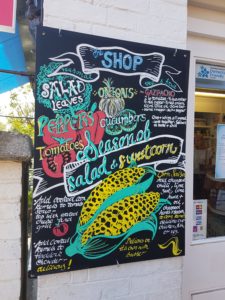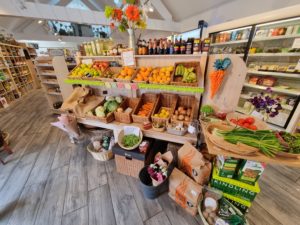Plunkett’s Head of Community Business, Claire Spendley sets out the case for community-owned food solutions in relation to the Government’s Food Strategy.
 Last month, DEFRA published the Government food strategy for England, acknowledging the extraordinary efforts at every stage of the food system to respond to an unprecedented surge in demand during the Covid-19 pandemic – from farming to manufacturing, distribution and retail – and setting out long-term measures designed to support a food system that offers access to healthy and sustainable food for all.
Last month, DEFRA published the Government food strategy for England, acknowledging the extraordinary efforts at every stage of the food system to respond to an unprecedented surge in demand during the Covid-19 pandemic – from farming to manufacturing, distribution and retail – and setting out long-term measures designed to support a food system that offers access to healthy and sustainable food for all.
The Strategy describes the food and drink industry as the UK’s largest manufacturing industry; creating wealth and employment in every region of the nation. It acknowledges the contribution local food makes to local identity and pride in place; and positions the food system as an integral part of the levelling up agenda. In a nation that produces around 75% of the food we consume – particularly when it comes to wheat, grain, milk and eggs – the strategy isn’t looking for more food to be home-grown. Instead, the objectives focus on boosting employment and training within the agri-food industry; levelling up in terms of health and life expectancy, by increasing the proportion of healthier food sold; reducing the environmental impacts of the food system and providing more export opportunities for UK food and drink businesses.
 On 30th June, I attended Tortoise Media’s ThinkIn session “Food crisis: can the UK feed itself?”, in which panellists Henry Dimbleby, Government Adviser and National Food Strategy Lead; Victoria Prentis MP, Minister of State at DEFRA and Bonnie Wright, Activist and Author of ‘Go Gently’ debated how we can create a healthy, sustainable food system in the UK. The key message from the event was that our food system is both “a miracle and a disaster”. Globally, food quantity is not a problem – but we have created a food system which is the biggest cause of freshwater pollution, the second biggest contributor to climate change, and the biggest cause of avoidable (non-communicable) disease. The food system we have now isn’t sustainable – and we need transformational change if we are going to turn the tide.
On 30th June, I attended Tortoise Media’s ThinkIn session “Food crisis: can the UK feed itself?”, in which panellists Henry Dimbleby, Government Adviser and National Food Strategy Lead; Victoria Prentis MP, Minister of State at DEFRA and Bonnie Wright, Activist and Author of ‘Go Gently’ debated how we can create a healthy, sustainable food system in the UK. The key message from the event was that our food system is both “a miracle and a disaster”. Globally, food quantity is not a problem – but we have created a food system which is the biggest cause of freshwater pollution, the second biggest contributor to climate change, and the biggest cause of avoidable (non-communicable) disease. The food system we have now isn’t sustainable – and we need transformational change if we are going to turn the tide.
In October 2021, Plunkett Foundation published our own Community Food Strategy, highlighting the injustices in the UK’s current food system, specifically in rural areas, and the potential for community-owned businesses to play a greater role in creating fairer access to food for all.
Our strategy aligns in many ways with what I heard at the event. Bonnie Wright highlighted that there are simple steps individuals can take to support the cause, and I was delighted to hear her say that people in communities across the UK are already championing great solutions to create fair, easy access for all to make healthy choices and reduce food waste. Bonnie pointed out that convenience was a key factor – that there should be close access for all to whole ingredients like vegetables and fruit; that access to these types of food should be easier than fizzy drinks, sweets and crisps. In our strategy, we demonstrate the long track record community businesses have for putting food in the hands of local communities – from the 450+ community-owned shops safeguarding vital food supply in rural communities; to those championing shorter supply chains to increase the resilience of food supply.
Victoria Prentis MP pointed out that as a result of the pandemic and the war in Ukraine, people are taking food availability much more seriously; and that the food system in the UK needs to address key issues around affordability, transparency of supply chains, and food labelling. She acknowledged that local food is often more environmentally friendly; supply chains are often better when they are shorter; and that transparency is always a good thing in a supply chain. Again, this is an area in which community businesses can (and do) excel – sourcing locally-grown produce ‘in season’, boosting the nutritional value of food; putting the community in control of its own food production through community farms or growing schemes; and enhancing access to healthy and nutritious food for all through community shops, pubs, cafes, bakeries and farmers’ markets.
During the event, we also he ard from Patrick Holden, a dairy farmer and one of the authors and researchers of the Sustainable Food Trust’s recently published report “Feeding Britain from the Ground Up”. Patrick shared the reports conclusion: that we could maintain our food security in the UK – but only if we change the way we eat. The feeling in the room was that this can’t be down to personal responsibility, as this leads to food inequalities – and that the focus of the Government’s food strategy white paper, due to be published this summer, should be on how the UK can feed itself well. This encompasses a variety of priorities – from early education, an overhaul of the current system for free school meals (both in terms of quality and eligibility), to putting healthier options in the spotlight. As we mention in our community food strategy, community businesses are already tackling many of these issues: from the free ‘school meals’ during the holidays provided by the Kings Arms Community Pub at Shouldham, to the school visits facilitated by Fordhall Community Farm.
ard from Patrick Holden, a dairy farmer and one of the authors and researchers of the Sustainable Food Trust’s recently published report “Feeding Britain from the Ground Up”. Patrick shared the reports conclusion: that we could maintain our food security in the UK – but only if we change the way we eat. The feeling in the room was that this can’t be down to personal responsibility, as this leads to food inequalities – and that the focus of the Government’s food strategy white paper, due to be published this summer, should be on how the UK can feed itself well. This encompasses a variety of priorities – from early education, an overhaul of the current system for free school meals (both in terms of quality and eligibility), to putting healthier options in the spotlight. As we mention in our community food strategy, community businesses are already tackling many of these issues: from the free ‘school meals’ during the holidays provided by the Kings Arms Community Pub at Shouldham, to the school visits facilitated by Fordhall Community Farm.
Support is available for community food groups
There is a real opportunity to scale-up community food businesses to support the creation of a fairer, more sustainable food system in the UK – from production and processing to retail – and Plunkett is committed to continuing to support community businesses to maximise the positive impact they can make in all of these areas. To find out how we can help you, please contact info@plunkett.co.uk.




